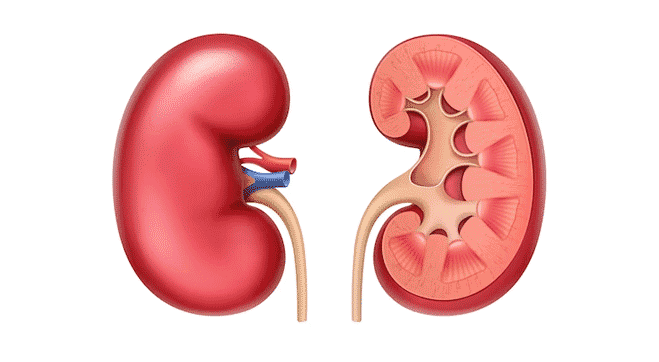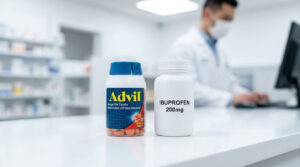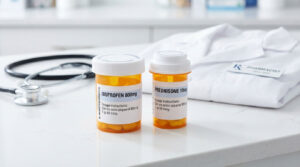What is the main function of kidneys?
Kidneys are crucial organs in the human body. All the blood in the body flows through the kidneys a hundred times each day. They push the liquid part of blood through tiny filters called nephrons, most of the fluid is then reabsorbed into the blood. In this way, kidneys purify the blood by excreting waste as urine and retaining enough water to keep the body hydrated to maintain balance.
Now, when kidneys are damaged, they are unable to cleanse the blood, and a stage of imbalance starts. Consequently, waste builds up in the body developing chronic kidney disease (CKD), over a long period of time, mostly due to Diabetes or high blood pressure or Acute kidneys Diseases, that occur abruptly due to diseases, medication or injury.
What is the function of creatinine?
Muscle cells and tissues use creatine to produce energy and the waste which is obtained during this process is kidneys. Typically, Creatinine travels through the blood to the kidneys. As it is a waste product, it is filtered through the kidneys where it is excreted out through urine. The kidneys maintain the levels in a normal range. These levels are found to be a fairly reliable indicators of kidney function. When the kidneys become impaired due to any reason, the blood creatinine levels rise as a result of poor creatinine clearance by the kidneys. Abnormally high levels of creatinine thus warns about the possible malfunctioning or failure of the kidneys. It is for this reason, that standard blood tests routinely checks the amount of creatinine in the blood.
The disorders are on rise, and everyone is prone to it regardless of their age, gender or race. Middleaged or muscular young adults may have more creatinine in their blood than the general population. Elderly persons may have less creatinine in their blood than the general population. Normal creatinine values in the blood are approximately 0.6 to 1.2 milligrams (mg)/deciliter (dL) and 0.5 to 1.1 mg/dL in adult males and females respectively. A person with only one kidney may have levels up to 1.8 or 1.9mg/dL. Levels that reach 2.Omg/dL or more in babies (depending on their muscle development) and 5.0mg/dL or more in adults indicate severe kidney impairment.”
In people with malnutrition, severe weight loss or long standing illnesses, the muscle mass tends to diminish over time and therefore, their creatinine level may be lower than expected for their age.
How do you measure creatinine clearance?
Normal creatinine clearance for healthy women is 88-128 mL/min and for healthy males is 97 to 137 mL/min (normal levels may vary slightly between laboratories). A more precise measure of the kidney function can be estimated by calculating how much creatinine is cleared from the body through kidneys. This is referred to as “Creatinine Clearance” and it estimates the rate of filtration by kidneys (glomerular filtration rate, or eGFR)
What is the normal GFR in adults?
eGFR is normally about 100 ml/minute. This means that the kidneys remove all the creatinine
found in 100ml of blood every minute, most of which is reabsorbed into the body, so that only
1-2% of the filtrate appears as urine. Creatinine clearance gives quite a good measure of GFR,
but requires a 24 hour urine collection for evaluation.
Two other ways of measuring GFR are:
eGFR (estimated GFR)- Uses blood tests, age, sex and sometimes other information to estimate the GFR. This is not as good as measuring GFR, but is much simpler as it requires just one blood test. It is being used increasingly to spot kidney disorders.
Measured GFR-Injecting a tiny amount of a radioactive or other substance, and measuring how quickly it disappears from the blood, or appears in the urine, is used to calculate GFR.
Knowing the GFR can give an approximate % of kidneys and can be used to specify the Chronic Kidney Diseases stage.
One may have kidney disorder if the GFR number is Above 60 with signs of kidney damage (having protein in the urine is a sign of kidney damage)
Below 60 for three months
Symptoms Associated with High Creatinine Levels
Depending on the cause of the problem, different symptoms of kidney failure
may be present including below:
Decreased urine output
Fluid retention, causing swelling in your legs, ankles or feet.
Shortness of breath.
Fatigue.
Confusion.
Nausea.
Weakness.
Irregular heartbeat.
Factors Elevating Blood Creatinine Levels
Any condition that impairs the function of the kidneys (kidney failure, high blood pressure and Diabetes) is likely to raise the creatinine level in the blood. Certain drugs (for example, Cimetidine) can sometimes cause abnormally elevated creatinine levels.
Serum creatinine can also increase abnormally and transiently, after ingestion of a large amount of dietary meat, this suggests that nutrition may sometimes play a role in abnormal creatinine values.
Kidney infections, rhabdomyolysis (abnormal muscle breakdown) and urinary tract issues (obstruction) may also elevate creatinine levels.
It is important to recognize whether the process leading to kidney
How do you cope with kidney failure?
Doctors recommend measuring creatinine levels in blood for testing kidney function. However, looking only at the creatinine levels in the blood is not the best way to check kidney’s health. This is because, these levels in the blood are affected by age, gender, race and body size. In other words, what is considered “normal” depends on these factors.
Book Complete Health Checkup Package
Below are the key factors to cope up with kidney failure:
Controlling blood pressure and blood glucose (if diabetic)
Taking medicines as prescribed
Developing a meal plan
Making physical activity a part of the routine
Getting enough sleep
Avoiding Smoking
Monitoring kidney health by regular check ups








